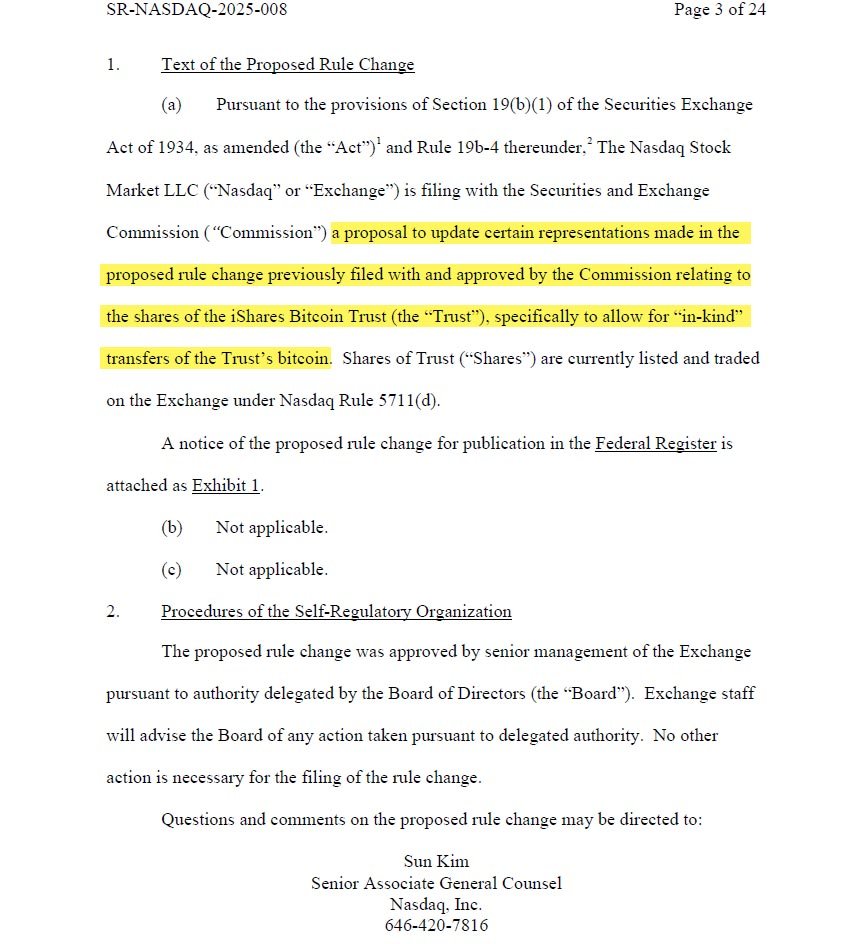Nasdaq is now looking to make it easier for Bitcoin exchange-traded funds (ETFs) to operate.
The exchange has filed with the U.S. Securities and Exchange Commission (SEC) to allow “in-kind” bitcoin redemptions for BlackRock’s iShares Bitcoin Trust (IBIT).
This will make the bitcoin ETF more institutional friendly and reduce redemptions costs.

If approved, Authorized participants (APs) will be able to redeem ETF shares for bitcoin itself instead of cash. Up until now, bitcoin have been must be sold to deliver cash to investors, a process that has been called out as complicated and costly.
The proposal calls this “an alternative to the Trust’s current cash creation and redemption process”.
However, its important to note that this change does not apply to retail investors. In-kind redemptions are only for institutional participants like APs. But experts think this will still benefit everyday investors by making Bitcoin ETFs more efficient.
The cash redemption model has been in place since January 2024 when the SEC first approved spot Bitcoin ETFs. The SEC chose cash redemptions for regulatory simplicity as they didn’t want brokers or financial firms to deal with bitcoin itself.
In an X post, Bloomberg ETF analyst James Seyffart announced the news, and engaged in a enlightening conversation with a user who wanted to understand the implications better.
He noted that regulators were hesitant to allow in-kind transfers at the time because “they didn’t want brokers touching actual bitcoin”.

As the Bitcoin ETF market continues to grown, Nasdaq and BlackRock think it’s time to move to a more efficient model. In-kind redemptions will reduce the steps and parties involved, save time and lower costs.
Seyffart went deeper into the mechanics of In-Kind vs In-Cash models, and said that ETFs should now trade even more efficiently than they did before because things can be streamlined.
Apart from operational efficiency, in-kind redemptions offer tax benefits. By not having to sell bitcoin for cash, ETFs can minimize capital gains distributions making them more tax efficient for institutional investors.
Another interesting point about this new development, is that it could reduce selling pressure on bitcoin during redemptions which could stabilize the price.
The proposal comes as part of broader changes in U.S. Bitcoin policy under the new Trump administration. Trump is pro-Bitcoin and has created a task force to make clear regulations, and has repealed SAB 121 which discouraged banks from offering digital asset custody services.
These changes have created a better environment for innovations like in-kind bitcoin redemptions. Seyffart said the repeal of SAB 121 was a key factor for Nasdaq’s filing. “The side effects from abolishing SAB 121 are likely only just beginning” he said.
BlackRock’s iShares Bitcoin ETF has been a hit since its launch in 2024. The fund has already gotten over $60 billion in inflows and is the largest and most popular spot Bitcoin ETF in the US.
Recently the fund saw a $2 billion inflow over 6 days and Nasdaq’s in-kind redemptions could make IBIT even more attractive to institutions by providing a more efficient and cost effective model.




